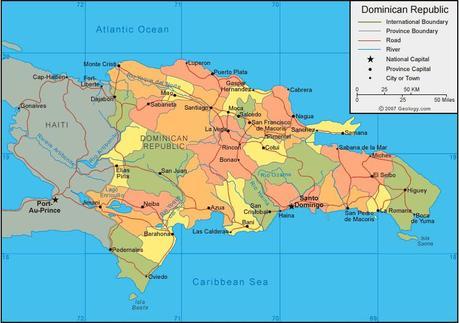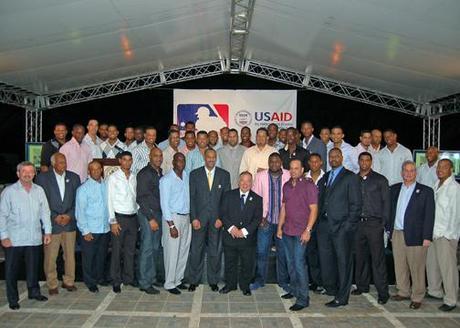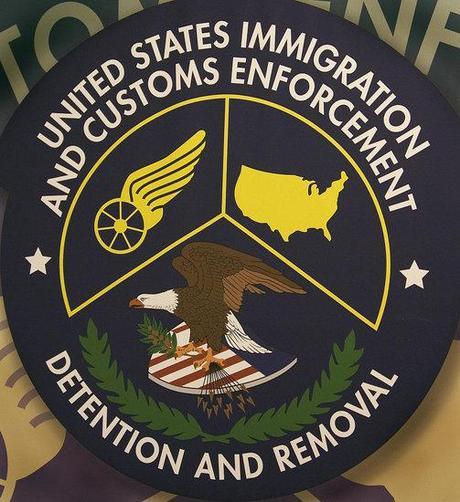 The pitcher we know as Leo Nunez made $3.6 million last year. He is third on the Marlins’ all-time saves list and should earn around $6 million next season – that is, if he is allowed to play baseball again. When my two worlds collide – obsessing over baseball and moonlighting as an immigration attorney – I almost feel obligated to write about it, because it is usually something rare and scandalous. But the only thing scandalous about what happened to Leo Nunez is that he is a somewhat high-profile athlete – and he got caught. Because, otherwise? This shit happens to regular people every day. That is why I am particularly interested in the outcome of his case; I am very curious to see if he will be treated like a regular immigrant, like any one of my hundreds of clients, or if Nunez will be magically waltzed through our complicated, strict, and often punitive immigration process.
The pitcher we know as Leo Nunez made $3.6 million last year. He is third on the Marlins’ all-time saves list and should earn around $6 million next season – that is, if he is allowed to play baseball again. When my two worlds collide – obsessing over baseball and moonlighting as an immigration attorney – I almost feel obligated to write about it, because it is usually something rare and scandalous. But the only thing scandalous about what happened to Leo Nunez is that he is a somewhat high-profile athlete – and he got caught. Because, otherwise? This shit happens to regular people every day. That is why I am particularly interested in the outcome of his case; I am very curious to see if he will be treated like a regular immigrant, like any one of my hundreds of clients, or if Nunez will be magically waltzed through our complicated, strict, and often punitive immigration process. But we should start at the beginning. Leo Nunez, the erratic closer for the Florida Marlins, was born in the Dominican Republic as Juan Carlos Oviedo; he is actually 29, a year older than his official team documents state. About 11 or 12 years ago, right before Nunez signed his first contract with the Pittsburgh Pirates, he was advised by a coach to fraudulently alter his name and age so that he would increase his value to Major League Baseball and his chances of being signed. In an almost admirable way, Oviedo chose the name of his best friend from childhood – Leonel Nunez Morales – before falsifying all of his documents and immigrating to the United States. “Juan Carlos Oviedo” became little more than a memory.
That is, a memory that would come back to viciously bite Leo Nunez in the ass. Recently, in the beginning of September, Nunez ran into a problem – one of his relatives passed away and he needed to return to the Dominican Republic. He could not explain, however, why he needed to go to the funeral of someone with the last name of Oviedo. And the Marlins began to catch on to his fraud. When he went to the consulate to obtain a new passport, he used his genuine identity documents to do so – and then flew back to Santo Domingo under his real name. He must have known that he was in a world of trouble, because he voluntarily came forward on September 7th and admitted to Dominican investigators what he had done. He now faces criminal charges in the DR, he has been placed on MLB’s restricted list, and he has been removed from the Marlins’ roster. A man named Hector Bienvenido Pena has also been arrested in connection with the investigation for providing false birth certificates to Nunez and several other people.
 Before we turn to the immigration consequences of his actions, I think it is important to ask: what would you do for $6 million? If your family was living in total poverty; if your only hope was to make about $150-200/month, the average salary in the Dominican Republic; if a few typos on some documents when you were a teenager could become the equivalent of a lottery ticket? I am not advocating for fraud or deception; I am simply highlighting the vast socioeconomic differences between a little boy in the United States playing little league and a little boy in Latin America, both with the same big dreams. The Dominican Republic provides Major League Baseball with more players than any other country. From a very young age, boys are guided by “buscones,” or personal trainers and coaches, who help showcase them to professional scouts (and, of course, earn percentages of whatever their eventual signing bonuses are). The younger the player, the more valuable he is; one year of age could cost someone hundreds of thousands of dollars. So it makes sense, then, to cut corners. These players have nothing to lose, except the poverty they come from and the families they leave behind. The promise of a better life, the American dream, is often worth the risk. And I can’t say that I necessarily blame them.
Before we turn to the immigration consequences of his actions, I think it is important to ask: what would you do for $6 million? If your family was living in total poverty; if your only hope was to make about $150-200/month, the average salary in the Dominican Republic; if a few typos on some documents when you were a teenager could become the equivalent of a lottery ticket? I am not advocating for fraud or deception; I am simply highlighting the vast socioeconomic differences between a little boy in the United States playing little league and a little boy in Latin America, both with the same big dreams. The Dominican Republic provides Major League Baseball with more players than any other country. From a very young age, boys are guided by “buscones,” or personal trainers and coaches, who help showcase them to professional scouts (and, of course, earn percentages of whatever their eventual signing bonuses are). The younger the player, the more valuable he is; one year of age could cost someone hundreds of thousands of dollars. So it makes sense, then, to cut corners. These players have nothing to lose, except the poverty they come from and the families they leave behind. The promise of a better life, the American dream, is often worth the risk. And I can’t say that I necessarily blame them. I mean, how can we blame the players when Major League Baseball is complicit in the charade? The Marlins knew about the Nunez drama sometime in early September – yet he was still pitching at the end of the season. If he had not come forward on his own accord, would the team have disclosed the information? It clearly was not in their interests to share his secret. Do we really expect a team to pass up on the next potential superstar because his birth certificate can’t be formally authenticated? Especially if the next potential superstar is some poor kid from the Dominican Republic who will never demand the type of signing bonus that an entitled American college kid now expects?

Representatives from the MLB Office in Santo Domingo.
It is not like this is a new problem to baseball. In fact, it is such a big problem that, in 2000, the League opened an office in Santo Domingo to work with the local government and review forged documents. After 9/11, when the United States went crazy with visa scrutiny, more than 500 players were discovered to be using false names or ages – almost half were from the Dominican Republic. In response, Major League Baseball offered a form of amnesty to foreign-born players in 2008: if you confessed to using fraudulent documents, a minor-leaguer would be suspended for one season, while a major-leaguer’s punishment would be determined on a case-by-case basis. I am not sure how this worked with our immigration authorities, but all-in-all, it seemed like a very fair deal. I am sure the possibility of suspension and the loss of livelihood acted as a severe deterrent, but it was most definitely better than the alternative – the situation that the Artist Formerly Known as Leo Nunez now finds himself in.Please remember – this is not a case of mistaken identity, but a willful and purposefully fraudulent hidden identity. There is a huge difference. From the very beginning, over a decade ago, Leo Nunez intentionally falsified his visa documents to travel to the United States; he has continued to falsify them every time he has had to renew his papers or file a different application. I will not pretend to know the individual facts of Leo Nunez’s immigration case. I do not know what type of visa he originally had; I do not know if he obtained permanent residency (his green card); I do not know if he has criminal convictions; and I do not know if he has any relatives in the United States who are citizens or permanent residents. So I am analyzing this with a limited set of information.

Nunez, who is currently in the Dominican Republic, now needs a visa, or permission, to be admitted back into the United States. He has a passport under his real name, Juan Carlos Oviedo, and most likely a visa under his assumed name (if that visa hasn’t already been revoked). Normally, if I had a client in Nunez’s position – someone who committed fraud, left the country, and now wants to return to the United States – he would require a Waiver of Inadmissibility. This would be the only way for him to be issued a new and proper visa. If he tried to re-enter without one, he would probably be detained at the airport and then placed into removal proceedings before the Immigration Court; or, he would just be sent back to the Dominican Republic on the next available flight. The specific type of waiver would be dependent upon whether Nunez plans to re-enter the country as an immigrant or non-immigrant. Since we do not have that information, we will assume that Nunez would apply as an immigrant, or someone who plans to obtain his green card in the future, for the purposes of this post. Thus, to be eligible for a waiver, an immigrant must have a qualifying relative – either a U.S. citizen or permanent resident spouse or parent – who would face “extreme hardship” if the alien was refused admission into the United States. See INA § 212(i). “Extreme hardship” is not a simple phrase with a clear-cut explanation; instead, it involves a careful balancing of numerous positive and negative factors. These factors include everything from time of residence in the United States, qualifying family members, criminal history, employment history, previous immigration violations, and a laundry list of other variables. It is an extremely high standard, but if met, it would waive whatever fraud or misrepresentation had been committed by the alien.

But Leo Nunez is a professional baseball player, an athlete of extraordinary ability, who makes millions of dollars every year. I am extremely curious to see how this plays out and if any strings are pulled to get him back on the mound in Florida. Only time will tell. But until then, and if you are reading this, Leo – please give me a call. I am confident that I can get you back to blowing saves for the Marlins by the 2012 season.


